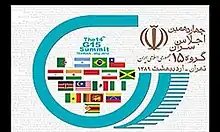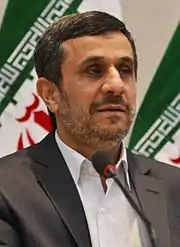14th G-15 summit
The Fourteenth G-15 summit was held in Tehran, Iran on May 17–20, 2010.[1] The bi-annual summit agenda of the Group of 15 (G-15)[2] encompassed a range of issues.[3]
| 14th G-15 Summit | |
|---|---|
 | |
| Host country | Iran |
| Dates | May 15–17, 2010 |
The gathering brought together leaders, representatives and policymakers from non-aligned nations. African G-15 nations are Algeria, Egypt, Kenya, Nigeria, Senegal, and Zimbabwe. Those from Asia are India, Indonesia, Iran, Malaysia, and Sri Lanka. Latin American G-15 nations include Argentina, Brazil, Chile, Jamaica, Mexico, Peru and Venezuela.[4]
Overview
The Group of 15 was established at the Ninth Non-Aligned Movement summit in Belgrade, Yugoslavia in September 1989. The name of this group is unchanging, but its composition has expanded to 18 countries.[4]
The G-15 is composed of countries from Africa, Asia, North America and South America. These non-aligned nations joined together to create a forum to foster cooperation and develop information which can be presented to other international groups, such as the World Trade Organization and the Group of Eight. The G-15 nations have a common goal of enhanced growth and prosperity. The group aims to encourage cooperation among developing countries in the areas of investment, trade, and technology.[4]
Meeting independently in Tehran, ministers from Brazil, Iran and Turkey negotiated an agreement on principles designed to revive a stalled nuclear fuel-swap deal backed by the United Nations.[5]
Leaders at the summit
Those nations represented at the summit were Algeria, Argentina, Brazil, Chile, Egypt, India, Indonesia, Iran, Jamaica, Kenya, Malaysia, Mexico, Nigeria, Peru, Senegal, Sri Lanka, Venezuela, and Zimbabwe. The G-15 membership has expanded to 18 countries, but the name has remained unchanged.[6]
The leaders of G-15 nations are core contributors in summit meetings,[7] but only some of the heads-of-state were at the Teheran event:
| Government leaders | ||
| President | Abdelaziz Bouteflika[8] | |
| President | Luiz Inacio Lula da Silva[8] | |
| President | Mahmoud Ahmadinejad[8] | |
| President | Abdoulaye Wade[8] | |
| President | Mahinda Rajapakse[8] | |
| Prime Minister | Recep Tayyip Erdogan[8] | |
| President | Robert Mugabe[9] | |
| represented by its permanent representative in Geneva[8] | ||
| represented by the president's special envoy [8] | ||
| represented by the Minister of Investment[10] | ||
| represented by its Foreign Minister.[8] | ||
| represented by the president's special envoy and the Minister of Industries[8] | ||
| Vice-President | Kalonzo Musyoka[11] | |
| represented by the Deputy Minister of Finance[3] | ||
| represented by its Ambassador to Iran[8] | ||
| represented by its Foreign Minister[8] | ||
Priorities
The G-15 perceive an ongoing need to expand dialogue with the G8 and with the G20. The G-15 want to help bridge the gap between developing countries and the more developed and industrialized nations. The fact that some of the G-15 are simultaneously members of these other forums is expected to be helpful.[4]
Issues
G-15 nations are united by shared perceptions of global economic issues; and the G-15 provides a structure for working out common strategies for dealing with these issues.[12] For example, the G-15 opposes using the international economic and financial systems as political instruments. The group condemns the use of coercive economic measures or laws against developing countries.[13]
G-15 nations have joined together in hopes of escaping from the more polemical atmosphere in other multi-national groups and organizations, such as the Group of 77 (G-77). For example, the 14th G-15 summit called for reform of Bretton Woods institutions and examining alternate sources of financing for the developing world.[13]
Schedule and Agenda
The summit was a venue for three-way talks between Turkish Prime Minister Erdogan and Brazilian President Lula da Silva and Iranian President Ahmadinejad. Their negotiations led to the announcement of a program of exchange in Turkey of Iran's low-enriched uranium for nuclear fuel processed abroad.[14] The announcement of a diplomatic break-through was met with scepticism in Western capitals.[15]
The summit focused on the importance of cooperation in facing the current challenges of food, energy, climate change, health and trade. The G-15 agenda included discussions of the Doha Round, intellectual properties and the global financial crisis.
The chairmanship of the G-15 passed from Iran to Sri Lanka at the end of the summit; and Sri Lanka will host the next scheduled group meeting in Colombo, the 15th G-15 summit in 2012.[4]
See also
Notes
- PressTv Archived 2010-06-01 at the Wayback Machine: "Iran to Host G15 Summit." Archived 2012-06-06 at the Wayback Machine May 20, 2010.
- The official website Archived 2017-09-12 at the Wayback Machine adopts the "G-15" orthography (with a hyphen) in order to distinguish an abbreviated reference to this group in contrast with other similarly named entities.
- Bernama (Malaysian National News Agency): "Ahmad Husni Represents Malaysia At G-15 Summit In Tehran." May 18, 2010.
- Prematillake, Tharindu. "Lanka Heads Powerful G-15 Serving Collective Interests," Archived 2010-05-28 at the Wayback Machine The Nation (Colombo). May 22, 2010.
- Barrionuevo, Alexei et al. "Brazil and Turkey Say a Nuclear Deal With Iran Is Near,"New York Times. May 17, 2010; "Brazil’s Iran Diplomacy Worries U.S. Officials," New York Times, May 14, 2010; retrieved 2011-08-26
- Afrasiabi, Kaveh L. "Cool G-15 heads take the heat," Asia Times (Hong Kong). May 15, 2010; retrieved 2011-08-26
- Rieffel, Lex. "Regional Voices in Global Governance: Looking to 2010 (Part IV)," Archived June 3, 2010, at the Wayback Machine Brookings. March 27, 2009.
- FARS News Service: "G-15 Summit Opens in Tehran," Archived 2012-03-01 at the Wayback Machine May 18, 2010.
- Farai Dzirutwe, Farai. "Zimbabwe: President Arrives in Iran." The Herald (Harare). 17 May 2010.
- Kotb, Mesbah and Mohamed Abdel Atty/ "Mubarak: Finance Crisis Shows Need for Global System," Al-Masry Al-Youm. May 18, 2010.
- "Kalonzo Decries Heckling At 'Yes' Campaign," The Nation (Nairobi). May 16, 2010.
- Chauhan, Sandeep. Demand for New International Economic Order, p. 129., p. 129, at Google Books
- Dikshit, Sandeep. "G-15 Deplores Imposition of Sanctions on Developing Countries," The Hindu (Chennai). May 19, 2010.
- "Iran 'Agrees' Nuclear Fuel Swap," Aljazeera. May 17, 2010.
- Sanger, David and Michael Slackman. "U.S. Is Skeptical on Iranian Deal for Nuclear Fuel," New York Times. May 17, 2010.
References
- Chauhan, Sandeep. (1997). Demand for New International Economic Order. New Delhi: MD Publications. ISBN 9788175330276; OCLC 222017407
External links
- Official Web Site
- Official Tehran Summit Web Site
- G-15 Summit in Tehran - Part I Part II on YouTube Part III on YouTube (Free PressTV documentary)
| Preceded by 13th G-15 summit |
14th G-15 summit 2010 Tehran |
Succeeded by 15th G-15 summit |

